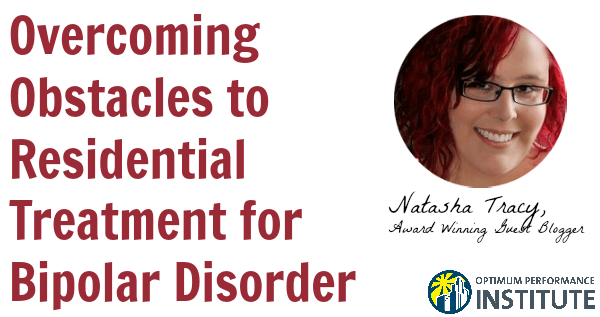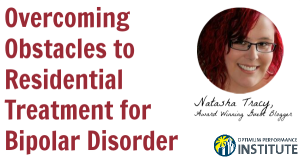
Overcoming Obstacles to Residential Treatment for Bipolar Disorder
Please join us in welcoming award winning mental health writer and guest blogger Natasha Tracy.
Overcoming Obstacles to Residential Treatment for Mental Illness
Having a mood disorder like depression or bipolar disorder at any age can be extremely challenging to deal with, but perhaps even more so as a young adult. As a young adult, people haven’t yet built up all the coping strategies possible to deal with their illnesses. Young people also may not have had the opportunity to seek adequate care.
And what is clear is that a mood disorder can plow through someone’s life and destroy relationships, employment, school and even a person’s safety. Often in these cases, intensive treatment is needed, and this can often be found through residential treatment. But many shy away from residential treatment due to stigma and the challenges involved in leaving one’s life for a period of time. Here are some tips on overcoming the obstacles you may face when considering residential treatment.
Facing the Stigma of Residential Treatment
There is a stigma against people who seek treatment in psychiatric facilities. Some people deem those who get that kind of helps as “crazy.” But what we know is that seeking out help is one of the best things you can do for yourself and shows that you care about your body, brain and mind and there’s absolutely nothing “crazy” about that.
If you run into someone who you think won’t be supportive you can always say you were spending time at a healthcare facility – which you were. The details of why you were there are nobody’s business.
Getting Time Off from Work or School
Some people fear that taking time off from work or school will be difficult, or even impossible. This is almost never the case.
As a person with a mental illness you are almost always considered a person with a disability and as a person with a disability you have rights. One of those rights is reasonable accommodation from an employer or learning facility. Look into your rights either under the law in your state or through your company’s handbook. You may have to legally declare yourself as a person with a disability to claim these rights but, certainly, your health is worth that. (Alternatively, you may simply be able to take medical leave without disclosing your mental health condition.)
Similarly, most schools have a students with a disability group, so seek them out. They are the best people to walk you through the process of getting academic accommodation from the school and from individual professors, if you need it.
Taking Care of Pets
Some people have beloved pets that they need cared for if they go into residential treatment. Hopefully, someone in the patient’s life can look after the pet, but if this isn’t possible, there are groups that can help. Just do a search online to find an organization near you or call your local Humane Society and ask for their recommendations. Boarding your pet or a pet sitter are other options but they can be pricy.
Anxiety about Residential Treatment
While residential treatment has shown itself to be a major success in so many people’s lives, many who could be helped aren’t because of their anxiety around getting residential treatment. This anxiety is completely normal. Who wouldn’t be anxious about going to a live-in healthcare facility?
Some tips on battling this anxiety include:
- Tour the grounds of the facility. See exactly what that facility has to offer.
- Take a friend with you when you visit the facility. He or she can help bolster your confidence so you can ask all the questions you need.
- Write down all the questions you want to ask the treatment facility staff ahead of time so that when you get to the facility, you’re guaranteed all the answers you need. (And if you find the facility can’t provide the answers, it may be time to look somewhere else.)
- Remember, knowledge is power and knowledge dispels fear and anxiety so get to know the facility’s website, seek out information from past patients and even get to know a staff member ahead of time (such as an intake worker), if possible.
- Discuss your residential treatment with your existing treatment team. Once they’re on board, you’ll likely feel more secure about your decision.
- Bring up your feelings of anxiety with your current therapist or even with the facility staff. Many, if not all, prospective patients have these feelings but you can work through them and feel comfortable with an residential stay.
Overcoming Obstacles to Residential Treatment for a Mental Illness
Residential treatment for a mental illness isn’t for everyone, but it certainly can help many people, and if this is you, don’t let obstacles stand in your way. You want to get better, you need to get better and you deserve to get better. That is the priority. Don’t let obstacles derail you from acting on that.
by Natasha Tracy @Natasha_Tracy
At Optimum Performance Institute, we offer compassionate, clinically sophisticated intensive residential help for young adults who suffer from bipolar disorder, including genetic testing to determine the best course for medications as needed. Rather than a sterile, hospital-like environment, we offer beautiful accommodations in luxury apartments just outside of Los Angeles. At OPI, we treat the individual, not the diagnosis. We are a diverse community of passionate, highly skilled individuals working together with you to help you find your joy and express it. For more information on OPI residential programs and our measures to help young adults with Bipolar Disorder, call us at (888) 814-5985 or click HERE to submit an online form. We’ll be in touch promptly.

